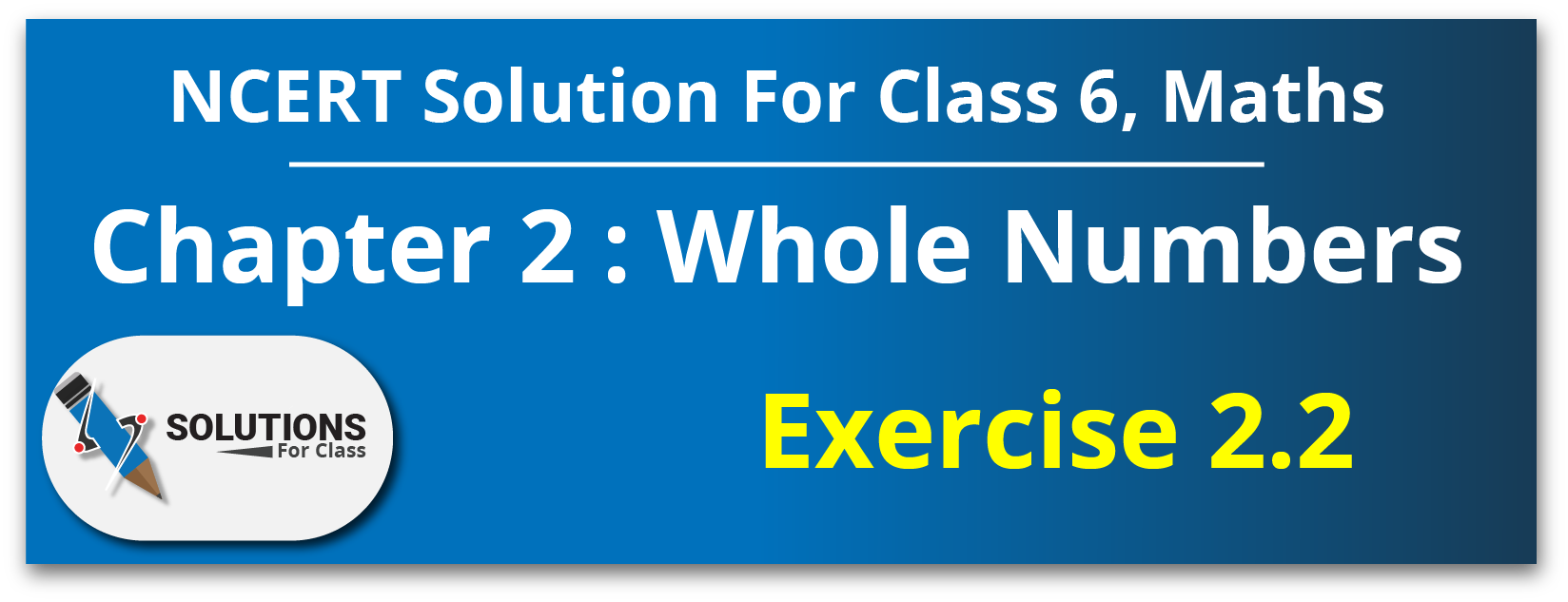
Table of Contents
ToggleNCERT Solutions for class 6 maths chapter 2 Exercise 2.2 is all about practicing of addition, subtraction, multiplication and dividing the numbers. there may be different ways to solve them with less amount of time. Class 6 maths chapter 2 exercise 2.2 solutions are provided here in simple ways. Class 6th maths 2.2 has total 7 questions to solve. so, students can check the solutions of whole number exercise 2.2 given below.
NCERT Solutions for Class 6 Maths, chapter 2, Whole Numbers, Exercise 2.2
Q.1. Find the sum by suitable rearrangement:
(a) 837 + 208 + 363
(b) 1962 + 453 + 1538 + 647
Ans:
(a) Given 837 + 208 + 363
= (837+363)+208
= 1200+208
= 1408
(b) Given 1962 + 453 + 1538 + 647
= (1962+1538) + (453+647)
= 3500+1100
= 4600
Q.2. Find the product by suitable rearrangement:
(a) 2 × 1768 × 50
(b) 4 × 166 × 25
(c) 8 × 291 × 125
(d) 625 × 279 × 16
(e) 285 × 5 × 60
(f) 125 × 40 × 8 × 25
Ans:
(a) 2 × 1768 × 50
= (2×50) × 1768
= 100×1768
= 176800
(b) 4 × 166 × 25
= (4 ×25) × 166
= 100 × 166
= 16600
(c) 8 × 291 × 125
= (8 × 125) × 291
= 1000 × 291
= 291000
(d) 625 × 279 × 16
=( 625×16) × 279
= 10000 × 279
= 2790000
(e) 285 × 5 × 60
= 285 × (5×60)
= 285 × 300
= 85500
(f) 125 × 40 × 8 × 25
= (125 × 8) × (40 × 25)
= 1000 × 1000
= 1000000
Q.3. Find the value of the following:
(a) 297 × 17 + 297 × 3
(b) 54279 × 92 + 8 × 54279
(c) 81265 × 169 – 81265 × 69
(d) 3845 × 5 × 782 + 769 × 25 × 218
Ans:
(a) Given 297 × 17 + 297 × 3
=(297 × 17) + (297 × 3)
= 297 × (17 + 3)
= 297 × 20
= 5940
(b) Given 54279 × 92 + 8 × 54279
= (54279 × 92) + (54279 × 8)
= 54279 × (92 + 8)
= 54279 × 100
= 5427900
(c) Given 81265 × 169 – 81265 × 69
= (81265 × 169) – (81265 × 69)
= 81265 × (169 – 69)
= 81265 × 100
= 8126500
(d) Given 3845 × 5 × 782 + 769 × 25 × 218
= (3845 × 5 × 782) + (769 × 5 × 5 × 218)
= (3845 × 5 × 782) + (3845 × 5 × 218)
= 3845 × 5 × (782 + 218)
= 19225 × 1000
= 19225000
Q.4. Find the product using suitable properties.
(a) 738 × 103
(b) 854 × 102
(c) 258 × 1008
(d) 1005 × 168
Ans:
(a) 738 × 103
= 738 × (100 + 3)
= (738 × 100) + (738 × 3)
= 73800 + 2214
= 76014
(b) 854 × 102
= 854 × (100 + 2)
= (854 × 100) + (854 × 2)
= 85400 + 1708
= 87108
(c) 258 × 1008
= 258 × (1000 + 8)
= (258 × 1000) + (258 × 8)
= 258000 + 2064
= 260064
(d) 1005 × 168
= (1000 + 5) × 168
= (1000 × 168) + (5×168)
= 168000 + 840
= 168840
Q.5. A taxi driver filled his car petrol tank with 40 litres of petrol on Monday. The next day, he filled the tank with 50 litres of petrol. If the petrol costs ₹44 per litre, how much did he spend in all on petrol?
Ans:
Petrol filled on Monday = 40 litres
Petrol filled on Tuesday = 50 litres
Total petrol filled = (40 + 50) = 90 litres
Now,
Cost of petrol per litre = ₹ 44
Total money spent = 44 × 90 = ₹ 3960
Therefore, he spent ₹ 3960 on petrol.
Q.6. A vendor supplies 32 litres of milk to a hotel in the morning and 68 litres of milk in the evening. If the milk costs ₹ 45 per litre, how much money is due to the vendor per day?
Ans:
Milk supplied in the morning = 32 litres
Milk supplied in the evening = 68 litres
Total milk supplied = (32 + 68) = 100 litres
Now,
Cost of milk per litre = ₹ 45
Total cost of milk per day = 45 × 100 = ₹ 4500
Hence, the money is due to the vendor per day is ₹ 4500.
Q.7. Match the following:
(i) 425 × 136 = 425 × (6 + 30 +100) (a) Commutativity under multiplication.
(ii) 2 × 49 × 50 = 2 × 50 × 49 (b) Commutativity under addition.
(iii) 80 + 2005 + 20 = 80 + 20 + 2005 (c) Distributivity of multiplication over addition.
Ans:


